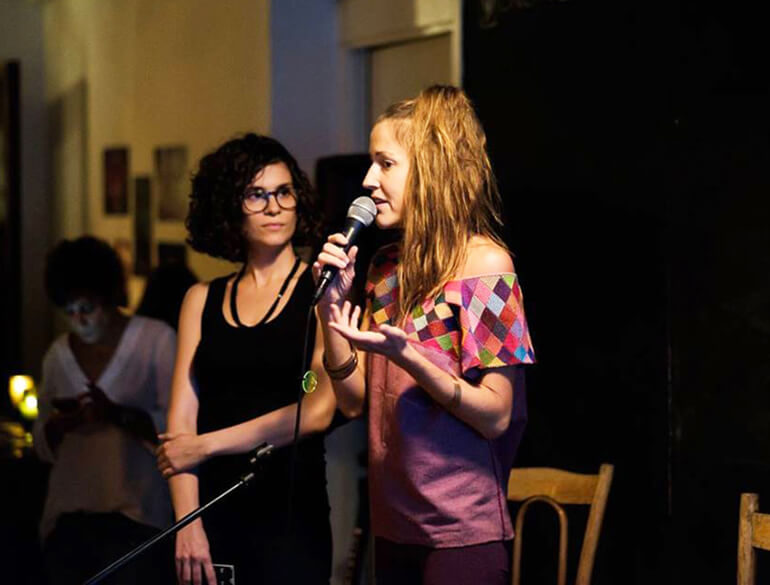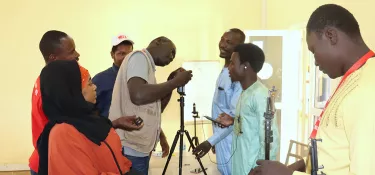
Mashallah News – Solution journalism in the Near East
Related project
EBTICAR-Media – Support for innovative online mediaOne day in my media organisation is a series of weekly reports illustrating the daily lives of people who work in media organisations across Africa, the Arab world and Southeast Asia, supported by CFI.
This week, we have an interview with Aun Qi Koh, sub-editor of the news website Mashallah News.
Mashallah is an Arabic expression used when someone encounters an astounding or surprising event. Founded in November 2014, Mashallah News is an online media platform launched by young journalists from the Near East. Devised as a collective blog, Mashallah News relies mainly on a network of contributors with diverse backgrounds and skills, including journalism, photography, research, art and graphic design.
Clément Girardot, 31, is one of the four coordinators and cofounders of the platform.
Spotlight on the dynamism of young people in the Near East
We wanted to build a bridge between major Arab population centres, those which have a shared historical heritage and which belonged to the Ottoman empire.When Clément was contacted in connection with this initiative he was a free-lance journalist in Istanbul. Mashallah News was set up as a response to the frustration felt owing to the generally pessimistic approach in the media to countries such as Turkey, Lebanon, Iran, Morocco, etc.
Clément explains. In addition to the coordinators, the editorial team includes around 30 journalists and bloggers who form a tight-knit community, producing numerous articles. Chosen topics address cultural subjects and aspects of society, with particular emphasis on life in towns and cities:
"We discuss forthcoming events and music, and human rights issues are a recurrent theme in our editorial approach", he points out.
Advocating production quality over production quantity,
Mashallah News focuses on photojournalism. Clément points out: “Above all, we want articles to make people think and then ideally to lead to solutions."
The website is accessible in three languages (French, English and Arabic), with English being predominant. Its primary target-audience is young people between the ages of 18 and 35. Their readership is more connected and multilingual: "Our secondary focus is the diaspora in these countries", Clément continues.
Since its launch in 2010, over 700 articles have been published, and in particular scores of themed reports, witness accounts and interviews concerning around thirty cities, principally Istanbul, Jeddah, Cairo, Teheran, Ramallah and Beirut.

Web-based management
Mashallah News has no physical headquarters, and the team is scattered across various countries. Meetings dealing with operational aspects of the website take place remotely via apps, such as Skype or WhatsApp. Contributors suggest a topic that they would like to write about, and if the coordinators agree they draft an article for publication on mashallahnews.com.
"There are lots of bloggers, so when articles are proofed we make sure that there are no personal comments. We publish mostly themed reports and witness accounts", the journalist explains. Sometimes, however, within the context of a project involving the media, contributors will be required to work to a particular format.
Mashallah News has a presence on Twitter, Facebook et Instagram: “There is no in-house strategy for producing content for social media because our budget is pretty small. Anyway, experience tells us that it's not such a good idea. When our media is dependent on such platforms, the changes in algorithms for article distribution generate a lot of stress, and panic ensues! Channels like these are used mainly for relaying articles on from our website, for maintaining a link with our readership", Clément confirms.
The principal problem with the media is one of funding.
Mashallah News is a not-for-profit venture. Team members work on a voluntary basis and generally have other, paid employment alongside their work for Mashallah News.
"Our sources of income are editorial projects in which we are involved or which we lead, and they are funded by development aid structures, such CFI in the case of the Ebticar project. We also offer training courses", says Clément Girardot.
Last year, together with two (French and German) associations, they organised a series of three workshops on the topic of migration.

An evolving media landscape
As for journalists' working conditions, Clément describes the situation as 'difficult', particularly in Turkey in the wake of the failed coup. At present there is a climate of defiance between the media and the Turkish people:
Much of the media is in government hands, and the authorities manipulate the population through those media.
Currently, Clément is based in Georgia: "Even though the media landscape in these countries has moved on since the wave of revolutions in 2011, Mashallah News is still a voice apart, a supplement to the other media. We take a step back from the chaos of current affairs, and share new themes that provide a new perspective and publicise a situation that is often not otherwise addressed", he concludes.
Outside of the website, in 2014
Mashallah News published a 300-page volume entitled Beyrouth, Chroniques et Détours [Beirut: Chronicles and Diversions], an anthology of accounts of forgotten lives in the Lebanese capital.
In the long term, the collective's ambition is to diversify further by publishing a second volume, dealing with another city in the Near East, and pursuing its training activities, while at the same time carrying on its primary task of covering current affairs in the Arab world, Turkey and Iran.


